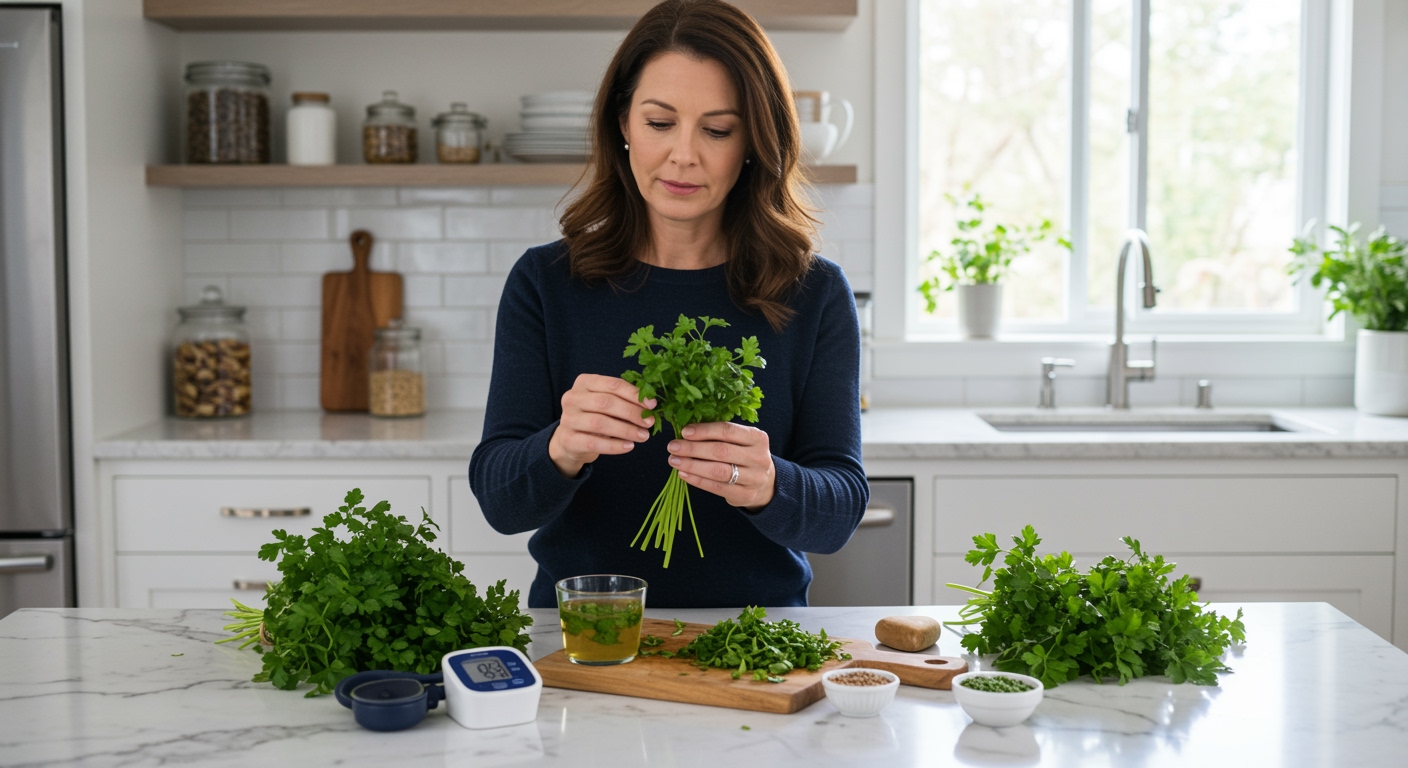✪ Key Takeaway: Low blood pressure patients can eat parsley safely in normal food amounts but should avoid large quantities or concentrated forms.
Introduction
You sprinkle it on your pasta, add it to your salad, and use it as a garnish without thinking twice.
But if you have low blood pressure, you might wonder whether this common green herb could make your condition worse or interfere with your efforts to maintain healthy blood pressure levels.
Hi, I’m Abdur, your nutrition coach, and today I’m going to explain everything you need to know about parsley and low blood pressure so you can make informed decisions about including this herb in your diet.
Does Parsley Lower Blood Pressure?
Parsley contains several bioactive compounds that can influence blood pressure, but the effects are generally mild when consumed in typical food amounts.
The herb contains flavonoids like apigenin and luteolin, which have been shown to have vasodilatory properties in laboratory studies.
These compounds work by helping blood vessels relax and widen, which can theoretically reduce blood pressure by decreasing resistance in your circulatory system.
Parsley also contains potassium, a mineral that helps balance sodium levels and supports healthy blood pressure regulation.
However, the concentration of these compounds in typical culinary uses of parsley is relatively low compared to what would be needed to produce significant blood pressure changes.
Most people use parsley as a garnish or seasoning, consuming only small amounts that are unlikely to cause meaningful drops in blood pressure.
✪ Fact: One tablespoon of fresh parsley contains only about 21 milligrams of potassium, which is less than 1% of your daily needs.
What About Parsley Tea and Concentrated Forms?
The situation changes when you consume parsley in concentrated forms like tea, extracts, or supplements.
Parsley tea involves steeping large amounts of the herb in hot water, which can extract higher concentrations of the active compounds that affect blood pressure.
Some people drink multiple cups of parsley tea daily for its supposed health benefits, which could potentially provide enough bioactive compounds to influence blood pressure readings.
Parsley also has mild diuretic properties, meaning it can increase urine production and potentially reduce blood volume.
This diuretic effect works through compounds that affect kidney function, causing your body to eliminate more sodium and water than usual.
For someone with already low blood pressure, this combination of vasodilation and fluid loss could theoretically cause blood pressure to drop further.
However, these effects are generally mild and temporary, and most healthy individuals can handle them without problems.
✪ Pro Tip: If you want to try parsley tea, start with one cup and monitor how you feel before increasing the amount.
How Much Parsley Is Safe for Low Blood Pressure?
For most people with low blood pressure, using parsley as a culinary herb in normal cooking amounts poses no significant risk.
This includes adding chopped parsley to salads, soups, sauces, and other dishes where you might use a few tablespoons at most.
The key is understanding the difference between food amounts and therapeutic or medicinal amounts of any herb.
Food amounts are what you would naturally consume as part of a normal diet, while therapeutic amounts are much higher concentrations used for specific health purposes.
If you have symptomatic low blood pressure that causes dizziness, fatigue, or fainting, you should be more cautious with any substance that could potentially lower blood pressure further.
This includes avoiding large amounts of parsley tea, parsley juice, or parsley supplements unless specifically recommended by your healthcare provider.
Pay attention to your body’s response when you consume parsley in any form, and reduce the amount if you notice increased dizziness or weakness.
✪ Note: Keep a food diary to track any symptoms that might be related to specific foods or herbs you consume.
Should You Worry About Drug Interactions?
Parsley can potentially interact with certain medications, particularly those that affect blood clotting and blood pressure.
The herb contains vitamin K, which plays a crucial role in blood clotting, and consuming large amounts could interfere with blood-thinning medications like warfarin.
If you take medications for low blood pressure or any cardiovascular condition, the mild blood pressure-lowering effects of concentrated parsley could theoretically enhance your medication’s effects.
This interaction is more likely to occur with therapeutic amounts of parsley rather than normal culinary use.
Some people with low blood pressure take medications to help raise their blood pressure, and consuming large amounts of parsley could work against these therapeutic efforts.
Always inform your healthcare provider about all herbs and supplements you consume regularly, even if they seem harmless.
Your doctor can help you determine whether your current parsley consumption is appropriate for your specific health situation and medication regimen.
✪ Pro Tip: Bring a list of all herbs and supplements to your medical appointments for accurate health assessments.
The Bottom Line
Low blood pressure patients can safely enjoy parsley in normal culinary amounts without significant concern, but should exercise caution with concentrated forms like teas or supplements.
The dose makes the poison, and the same principle applies to beneficial herbs like parsley.
I would love to hear about your experiences with parsley or any questions you might have about managing low blood pressure through nutrition, so please share your thoughts in the comments below.
References
At NutritionCrown, we use quality and credible sources to ensure our content is accurate and trustworthy. Below are the sources referenced in creating this article:
- PubMed: Parsley and Blood Pressure Research
- Healthline: Parsley Nutrition Facts
- Healthline: Herbs to Lower Blood Pressure
- Vinmec: Herbs That Help Lower High Blood Pressure





